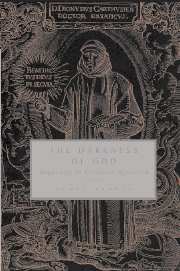Book contents
- Frontmatter
- Contents
- Acknowledgements
- Introduction
- PART ONE TWO SOURCES AND A SYNTHESIS
- PART TWO DEVELOPMENTS
- 6 Eckhart: God and the self
- 7 Eckhart: detachment and the critique of desire
- 8 The Cloud of Unknowing and the critique of interiority
- 9 Denys the Carthusian and the problem of experience
- 10 John of the Cross: the dark nights and depression
- 11 From mystical theology to mysticism
- Further reading
- Index
10 - John of the Cross: the dark nights and depression
Published online by Cambridge University Press: 23 November 2009
- Frontmatter
- Contents
- Acknowledgements
- Introduction
- PART ONE TWO SOURCES AND A SYNTHESIS
- PART TWO DEVELOPMENTS
- 6 Eckhart: God and the self
- 7 Eckhart: detachment and the critique of desire
- 8 The Cloud of Unknowing and the critique of interiority
- 9 Denys the Carthusian and the problem of experience
- 10 John of the Cross: the dark nights and depression
- 11 From mystical theology to mysticism
- Further reading
- Index
Summary
We have seen in Denys the Carthusian the emergence of what I have called ‘experientialism’, if only negatively in and through his resistance to it. Denys, however, is not familiar to a contemporary readership, whereas John of the Cross is all too familiar to it, to the point where the history of Western Christian ‘mystical theology’ is in some ways distorted by his prestige. It is, in any case, all too easy to read John of the Cross exclusively as an ‘early modern’ writer, to detach his work from its roots in the medieval tradition, and in no respect is this more likely, or more misleading, than in the tendency to characterize John's ‘modernity’ precisely by its ‘experientialism’. It cannot be wrong to see John as an ‘early modern’. It cannot be right, however, to neglect those respects in which John is deeply indebted to – that is to say, is thoroughly dependent upon – the mediaeval traditions of apophatic mysticism. And if ‘modernity’ is to be characterized by a preoccupation with the phenomena of the subjective and the experiential, then there is no doubt that in this respect John is a ‘modern’. On the other hand, if ‘experientialism’ is to be characterized by its translation of the dialectical categories of a Ncoplatonic theological epistemology into categories of subjective experience, then it is the argument of this chapter that John of the Cross is distinctly not an ‘experientialist’.
- Type
- Chapter
- Information
- The Darkness of GodNegativity in Christian Mysticism, pp. 226 - 251Publisher: Cambridge University PressPrint publication year: 1995



